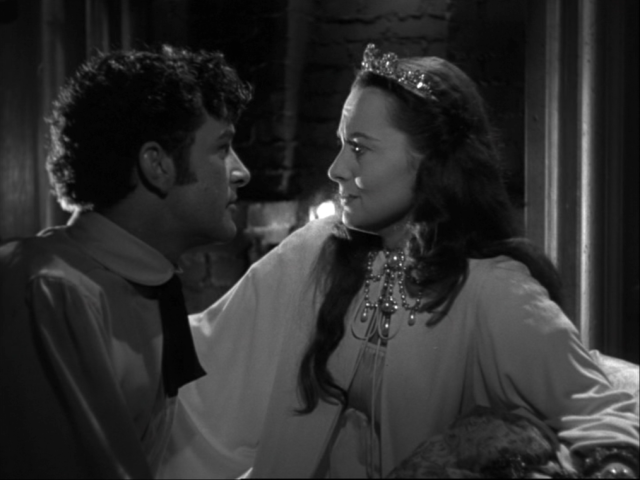
I had tried initially to resist the temptation of mentioning Rebecca, but, on a purely superficial level, My Cousin Rachel is unbelievably similar to Rebecca, practically begs for comparison to its predecessor. Both feature a du Maurier tale, a Shakespearean actor in his acting prime and one half of the de Havilland sisters.
In fact, My Cousin Rachel can also be viewed as something which is to Rebecca what Jezebel is to Gone With the Wind. The undisputed classic of both pairs boasts bigger (ish) stars, a more famous and respected director, and, quite interestingly, good ol’ David O Selznick backing the picture. And once again, I believe the apparently “lesser” of the two films does not at all deserve such a reputation.
It is true that at the film’s head is not the master of suspense, but the very talented Henry Koster. This is probably the most distinctive difference between the two movies. Koster, like his cinematic counterparts Zinnemann and Wyler, is what I like to refer to as an “actor’s director.” He had a particularly special talent for utilising his actors and actresses in a truly unique way, and often brought out the very best and most stylistically relevant performances that he or she was capable of. My Cousin Rachel is definitely no exception.
At age of 25, Richard Burton plays here in the first of his American films, and also, the first of many great performances. The character of Ashley is unique among the gothic hero type for he is not at all an enigmatic outsider, but rather a gentlemen entirely within the bounds of society. Philip Ashley is also, however, a young man, capable of flurries of intense, at times, almost inexplicable, emotion. It is on this front that Burton is most successful.
Upon hearing of his (very wealthy) cousin Ambrose’s marriage to a distant relative, Philip quietly seethes with jealousy for his cousin’s new bride Rachel. (Ambrose, has, after all, served as both father and friend to Philip throughout his life). When he hears of his cousin’s death, Philip makes no effort to hide his rage, as well as his suspicions that it was Rachel who figured in his death.
However, when Rachel arrives at his home (after a curt invitation; Philip wanted to see the horrifying woman for himself) Philip’s perceptions of Rachel becoming something altogether different. In Burton’s eyes, we can actually see the varying degrees of emotion he feels for the beautiful and charming Rachel: anger, morphing quickly into disbelief, and in turn growing into love and dangerous obsession, to the extent that he is blinded by the dangers that Rachel herself poses. He hurls evidence of her guilt into the fire, and succumbs almost entirely to his emotions.

As for the object of his affections, Rachel Ashley is also a wonderful character, and her portrayer a magnificent actress. The aspect that many feel to be quite unsatisfactory about My Cousin Rachel is the unbelievable enigma that surrounds the titular character. Is she or is she not innocent? Evidence for her innocence trumps evidence for her guilt, then there’s a startling development that doesn’t add up, afterwards we discover something that makes the mind just boggle. And so on and so forth.
Olivia de Havilland, however, does not attempt to tackle this problem; on the contrary, she succeeds simply by embodying the mystery of Rachel. The effect is an interesting one; we can never be certain about the true character of Rachel Ashley. Watching her from the perspective of Philip, we see mystery shrouded in more mystery, and yet we are entirely captivated. As for the tragic conclusion, there is no doubt that there is a genuine and heartbreaking disbelief in her eyes. In that moment, even if we have been suspicious from the outset, her sorrow touches us profoundly.
My Cousin Rachel is very much a character piece, with its actors at the forefront of the production. However, it would not be the film it is without the dreamy camerawork Joseph LaShelle, the delicate direction of Henry Koster, or even Waxman’s fascinating score. The movie straddles the genres of noir and period, and it is the array of talent associated with it that gives rise to the sumptuous drama of both strata coming together.
I leave you finally with the full-circle ending of My Cousin Rachel, where every element comes together to create a beautiful composition. Burton stands on the cliffs, just as he did at the beginning of the film. His face is lit expressively, with portions of it obscured by shadow. As the music swells to a melancholic climax, we realise he is looking out to the crashing and ever-changing waves, and we are reminded once more of the thunderous unpredictability of Rachel herself. Because of Rachel, Philip Ashley has been left a changed man; nevertheless, we believe hopefully that Philip can, and will, allow his life to go on.


